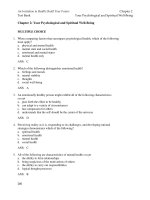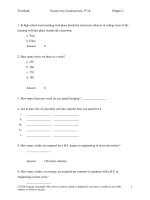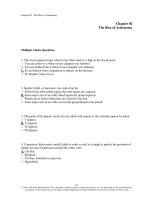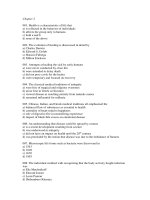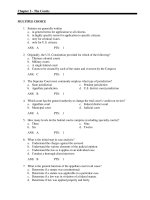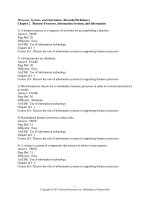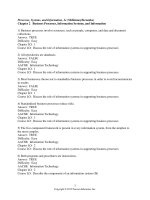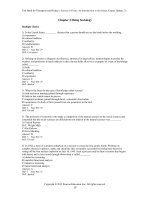Engineering fundamentals an introduction to engineering 5th edition saeed moaveni test bank
Bạn đang xem bản rút gọn của tài liệu. Xem và tải ngay bản đầy đủ của tài liệu tại đây (21.42 KB, 7 trang )
Engineering Fundamentals, 5th ed.
Test Bank
Chapter 2
1. In high school most learning took place inside the classroom whereas in college most of the
learning will take place outside the classroom.
a. True
b. False
Answer:
b
2. How many hours are there in a week?
a. 158
b. 168
c. 178
d. 148
Answer:
b
3. How many hours per week do you spend sleeping? _________________
4. List at least five of your daily activities and the time you spend for it.
i.
_________________ _________________
ii.
_________________ _________________
iii.
_________________ _________________
iv.
_________________ _________________
v.
_________________ _________________
5. How many credits are required for a B.S. degree in engineering in most universities?
_________________
Answer:
128 (most schools)
6. How many credits, on average, are required per semester to graduate with a B.S. in
engineering in four years?
_________________
© 2016 Cengage Learning®. May not be scanned, copied or duplicated, or posted to a publicly accessible
website, in whole or in part.
1
Engineering Fundamentals, 5th ed.
Test Bank
Answer:
Chapter 2
16 (most schools)
7. How many credits are you taking this semester? _________________
8. How many hours should you spend studying outside of class for each hour spent in an
engineering class?
_________________
Answer:
3 (for most engineering courses)
9. It is not a good idea to take notes on loose papers because you may displace or lose them.
a. True
b. False
Answer:
a
10. A good way to learn something is to explain ideas and concepts in your own words to others
in a group.
a. True
b. False
Answer:
a
11. It is a good idea to attend class regularly, because your professor may offer additional
explanations and discussion of some material in class that may not be well presented in your
textbook.
a. True
b. False
Answer:
a
© 2016 Cengage Learning®. May not be scanned, copied or duplicated, or posted to a publicly accessible
website, in whole or in part.
2
Engineering Fundamentals, 5th ed.
Test Bank
Chapter 2
12. It is a good idea to read the material that your professor is planning to cover in class ahead of
time. It is also important to go over the material that was discussed in class again later the same
day after the lecture was given.
a. True
b. False
Answer:
a
13. During a typical four-year engineering program, in which year will you take the calculus I
class:
a. Year 2
b. Year 4
c. Year 1
d. Year 3
Answers:
c
14. What does ASCE stand for?
a. American Society of Civil Engineers
b. American Society of Chemical Engineers
c. Association of Service Coordinating Engineers
d. All-State Corps of Engineers
Answer:
a
15. What does SAE stand for?
a. Society of Agricultural Engineers
b. Society of Automotive Engineers
c. Society of Aerospace Engineers
d. Society of Aeronautical Engineers
Answer:
b
16. What does ASME stand for?
a. American Society of Manufacturing Engineers
© 2016 Cengage Learning®. May not be scanned, copied or duplicated, or posted to a publicly accessible
website, in whole or in part.
3
Engineering Fundamentals, 5th ed.
Test Bank
Chapter 2
b. American Society of Metallurgical Engineers
c. American Society of Mechanical Engineers
d. American Society of Marine Engineers
Answer:
c
17. What does IEEE stand for?
a. Institute for Electrical and Electronics Engineers
b. Institute of Electrical and Electronics Engineers
c. International Electrical and Electronics Engineers
d. Industrial Electricians and Electrical Engineers
Answer:
b
18. What does SME stand for?
a. Society of Manufacturing Engineers
b. Society of Mechanical Engineers
c. Society of Materials Engineers
d. Society of Metallurgical Engineers
Answer:
a
19. Volunteering is a good way to feel connected to your community. Volunteering could also
help develop communication, management, or supervisory skills that you may not develop by
just attending school.
a. True
b. False
Answer:
a
20. Engineering organizations are only for practicing engineers and not for engineering students
a. True
b. False
Answer:
b
21. The best time to discuss your graduation plan with your advisor is during the year in which
you plan to graduate.
© 2016 Cengage Learning®. May not be scanned, copied or duplicated, or posted to a publicly accessible
website, in whole or in part.
4
Engineering Fundamentals, 5th ed.
Test Bank
Chapter 2
a. True
b. False
Answer:
b
22. It is a good practice to have your questions formulated and well thought out before you go to
see your professor.
a. True
b. False
Answer:
a
23. A good way to learn something is to form discussion groups where you explain ideas and
concepts in your own words to others in the group.
a. True
b. False
Answer:
a
24. Only a few people need to participate in a study group
a. True
b. False
Answer:
b
25. It is a good idea to wait until the night before the exam to study
a. True
b. False
Answer:
b
26. It is a good idea to study for exams on a daily basis
a. True
b. False
Answer:
a
© 2016 Cengage Learning®. May not be scanned, copied or duplicated, or posted to a publicly accessible
website, in whole or in part.
5
Engineering Fundamentals, 5th ed.
Test Bank
Chapter 2
27. Becoming acquainted with junior and senior engineering students can provide you with
valuable information about their engineering education experience and campus social issues.
a. True
b. False
Answer:
a
28. It is important to join engineering organizations because they offer benefits such as:
a. They conduct conferences and meetings to share new ideas and findings in research
and development.
b. They publish technical journals, books, reports, and magazines to help engineers in
particular specialties keep up-to-date.
c. They offer short courses on current technical developments to keep practicing
engineers abreast of the new developments in their respective fields.
d. They provide a networking mechanism through which you get to know people from
different companies and institutions.
e. all of the above
Answer:
e
29. Volunteering is a way to develop additional important skills such as communication,
management, or supervisory skills that may not be taught in your classes.
a. True
b. False
Answer:
a
30. It is also a good idea to sit down with your advisor and plan your graduation. List all of the
classes that you need to take in order to obtain your degree in four or five years.
© 2016 Cengage Learning®. May not be scanned, copied or duplicated, or posted to a publicly accessible
website, in whole or in part.
6
Engineering Fundamentals, 5th ed.
Test Bank
Chapter 2
a. True
b. False
Answer:
a
© 2016 Cengage Learning®. May not be scanned, copied or duplicated, or posted to a publicly accessible
website, in whole or in part.
7

